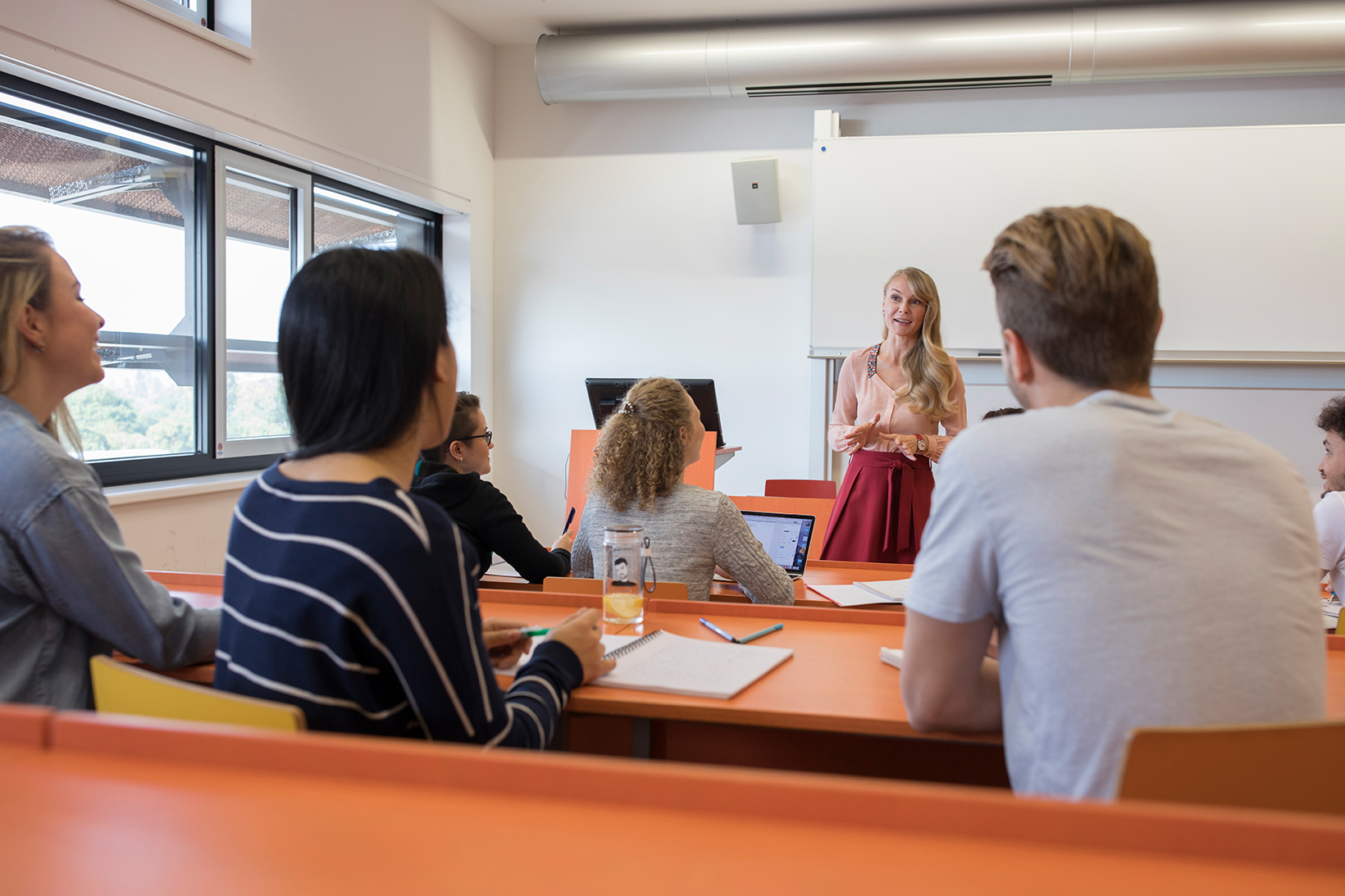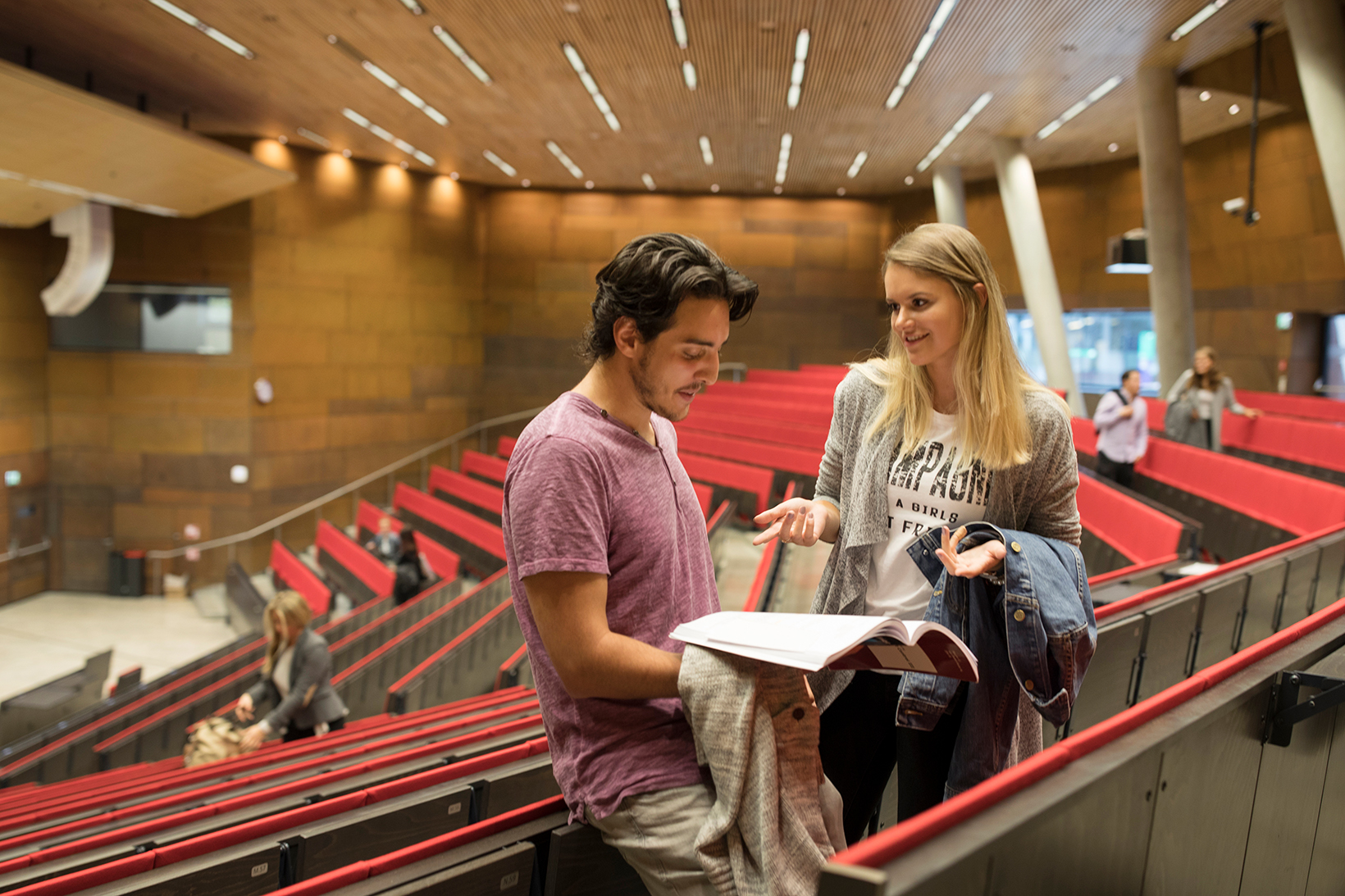Committed to teaching
WU’s teachers love what they do, and use their enthusiasm and didactic expertise to motivate their students. To show our appreciation for their work, WU awards prizes for excellent and innovative teaching every year.
Excellent Teaching Award
We ask our students on a regular basis which of their teachers inspired them the most over the past academic year. Every student has the opportunity to nominate 2 teachers online and give the reasons for their nominations. A jury then selects the winners of the Excellent Teaching Award from all the submitted nominations.
2019 award winners
- Ingolfur Blühdorn, Department of Socioeconomics
- Walter Böhm, Department of Finance, Accounting and Statistics
- Ana Garcia Esteban, Department of Foreign Language Business Communication
- Birgit Höfler, Department of Finance, Accounting and Statistics
- Stefan Perner, Department of Private Law
- Alice Pohl, Department of Public Law and Tax Law
- Michael Posch, Department of Management
- Julia Roth, Department of Economics
- Milda Zilinskaite, Department of Foreign Language Business Communication
- Moritz Zoppel, Department of Private Law

Innovative Teaching
The teachers who receive the Innovative Teaching Award are characterized by outstanding creativity. They take up new ideas and give students plenty of space to gain practical experience.
In 2019, the award went out to course designs with particularly innovative forms of assessment:
International Business Applications
Anita Gerstbauer, Marius Brand, Vera Kunczer, Harald Puhr, Jan Schmitt, Kathrin Schwaiger
This bachelor’s-level course allows students to apply theory and concepts in the field of international business in practice to real-life business cases. The course combines a number of different assessment forms and didactic elements (in-class business cases, discussing papers, presentations, peer rating, group assignments, individual assignments).
Research Proposal
Franz-Karl Skala
The objective of this course is to guide students through the process of preparing a proposal for their master’s thesis by providing constructive feedback. The learning process is accompanied by a series of progressive assessments (a visual outline of the master’s thesis, discussion of the sketch with peers, preparation of a draft proposal, blind review of an assigned proposal, poster presentation, preparation of the proposal).
Sustainable Economics and Business I
Andreas Novy, Veronika Heimerl, Christoph Ambach
“Sustainable Economics and Business” is attended by 650 students and is based on an inverted classroom principle. Students learn basic concepts independently using literature, Lecturecasts, and written homework assignments. During the course, they build on what they have learned in short lectures, group work, quizzes, and discussions with guest lecturers.
Economics of Distribution
Stefan Humer, Matthias Schnetzer
This course is part of the specializations offered in the Master’s Program in Economics. Class activities include writing Wikipedia entries on the distribution of income in European countries, accompanied by Wikipedia staff members. Particular attention is paid to the feedback process: In addition to peer feedback and evaluation by the teachers, the Wikipedia entries are also reviewed by the Wikipedia community and the readers.
Special Topics: It’s about Time
Bernadette Kamleitner
“Special Topics: It’s about Time” deals with the role of time in marketing and consumption. Different methods and assessment elements (observation protocol, case studies, poster exhibition) are applied throughout the course. The students work on a practical business case, and in a final poster presentation they learn to discuss and defend their case study in front of an audience.

International recognition
The impact of our faculty’s innovative power extends far beyond Campus WU: The courses developed and taught at our university receive international awards year after year.
WU Professor Günter Stahl received the CEMS Course of the Year Award for the 6th time in 2019. His core course “Responsible Global Leadership” aims to sensitize students to the ethical dilemmas and major social challenges of our time, as presented in the Sustainable Development Goals of the United Nations. Participants learn behavioral strategies and leadership skills that encourage globally responsible action in a wide range of contexts.
Clive Spash and Viviana Asara from WU’s Institute for Multi-Level Governance and Development received the CEMS Outstanding Contribution Award for their “Climate Change Course,” together with colleagues from ESADE, Bocconi, the University of St. Gallen, Corvinus University of Budapest, SGH Warsaw School of Economics, the University of Cologne, Stockholm School of Economics, and Rotterdam School of Management.
Ten years ago, WU Professor Gerhard Speckbacher developed a method for implementing problem-based learning even for large-scale classes. In the course “Introduction to Business Administration,” he works with interesting case studies. For example, he explains strategy using the famous boxing match between George Foreman and Muhammad Ali. The story of a small taxi company shows why the difference between cash flow and profit is important, and an analysis of Tesla helps students to see the difference between a company’s book value, present value of future profits, and market value. During the lecture, students can ask questions by text message or WhatsApp and get an immediate answer. This means they can also actively participate in class, even from the back row of the auditorium. With his motivating course design, Gerhard Speckbacher gets 2,000 students interested in business administration every year.
Other universities have also started applying this concept. At Freie Universität Berlin, for example, it has gotten extremely positive feedback from students and has been awarded with a teaching prize.

